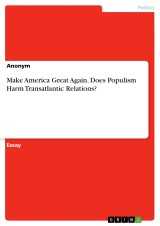Details

Make America Great Again. Does Populism Harm Transatlantic Relations?
1. Auflage
|
13,99 € |
|
| Verlag: | Grin Verlag |
| Format: | |
| Veröffentl.: | 04.03.2021 |
| ISBN/EAN: | 9783346357588 |
| Sprache: | englisch |
| Anzahl Seiten: | 13 |
Dieses eBook erhalten Sie ohne Kopierschutz.
Beschreibungen
Essay from the year 2019 in the subject Politics - Topic: International relations, grade: 1,3, Rhine-Waal University of Applied Sciences (Society and Economics), language: English, abstract: This paper tries to answer the question, if populism does harm the Transatlantic Relations. In order to do so, it first sets out to give a quick definition of the term itself, before its attention to the rise of populism in European states. In a third step, economic impacts, such as the sanctions against Iran, are put against the backdrop of the aforementioned rise of populism. Finally, a quick overview over the findings concludes the essay.
Populism has a long-lasting history and was already observed under Julius Caesar in the Roman Empire. It did not become a widespread phenomenon and familiar term until the 1890s, when in America the first agrarian movements started, through which later the People’s party developed.
Until now, there is no single definition provided for the term populism. Scholars from the London School of Economics define populism as any of the following three:
1. The frustration over declines in the status of welfare
2. A nationalist nostalgia
3. A political strategy in which a charismatic leader appeals to the masses while sweeping aside institutions
The Economist sates that most influential definition was introduced in 2004 by Mudde. In the Economist, Muddes defined the term populism as an ideology that establishes an ideological framework of the pure people versus a corrupt elite. Mudde demands that politics should be an expression of the volonté general. Furthermore, a distinction between exclusive and inclusive populism has to be made. Exclusive populism describes the phenomenon of shutting out stigmatised groups, and is mainly found in Europe and North America. Whereas inclusive populism demands that politics be opened up to stigmatised groups and is mainly represented in Latin America.
In the paper, the term populism always refers to Muddes definitions of populism as an ideological framework.
Populism has a long-lasting history and was already observed under Julius Caesar in the Roman Empire. It did not become a widespread phenomenon and familiar term until the 1890s, when in America the first agrarian movements started, through which later the People’s party developed.
Until now, there is no single definition provided for the term populism. Scholars from the London School of Economics define populism as any of the following three:
1. The frustration over declines in the status of welfare
2. A nationalist nostalgia
3. A political strategy in which a charismatic leader appeals to the masses while sweeping aside institutions
The Economist sates that most influential definition was introduced in 2004 by Mudde. In the Economist, Muddes defined the term populism as an ideology that establishes an ideological framework of the pure people versus a corrupt elite. Mudde demands that politics should be an expression of the volonté general. Furthermore, a distinction between exclusive and inclusive populism has to be made. Exclusive populism describes the phenomenon of shutting out stigmatised groups, and is mainly found in Europe and North America. Whereas inclusive populism demands that politics be opened up to stigmatised groups and is mainly represented in Latin America.
In the paper, the term populism always refers to Muddes definitions of populism as an ideological framework.
Diese Produkte könnten Sie auch interessieren:

How Insights from Moral Psychology and Character Research can aid Development Cooperation

von: Jan Prothmann

13,99 €















